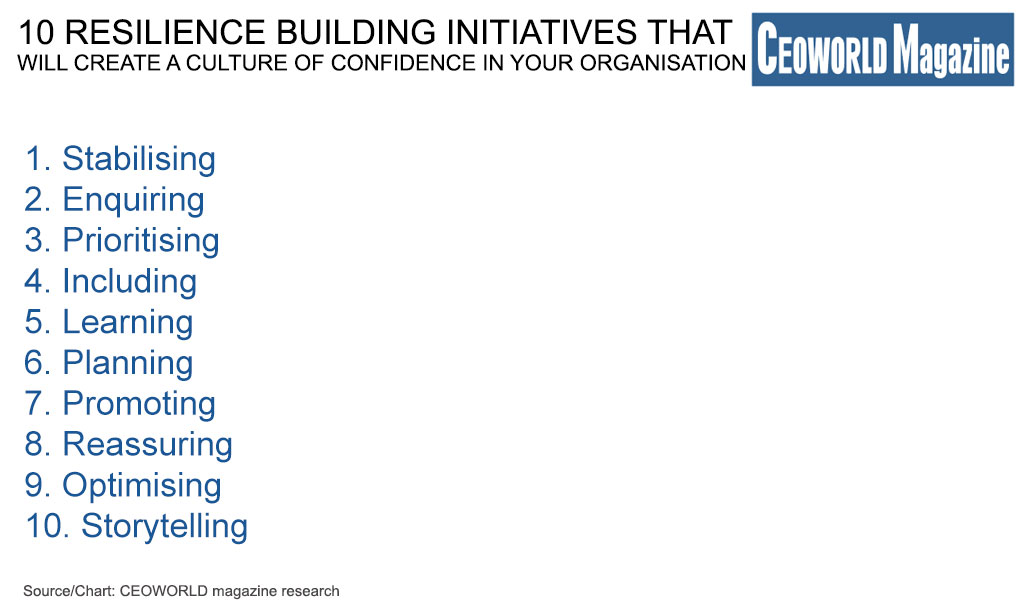10 Resilience Building Initiatives that will Create a Culture of Confidence

In an organisational context resilience is a label that often attaches to its leaders ability to take on the full force of disruption, to dust themselves off and to soldier on.
Resilience is actually about emotional strength – our ability to adapt and bounce back when things are not going to plan, to not only endure adversity but to become stronger emotionally whilst dealing with it.
A resilient organisation is one that has the capacity to proactively react to change and to grow through and from it. This is the culture of confidence – the unwavering optimism that despite challenge, the people within the organisation are motivated to strive for stretch targets, or to extract more with less, or to create better not bigger – as a group.
Ultimately it is the successfully resilient leader that will unlock this group discretionary effort in any circumstance. They will have empowered a cohort of equally resilient people who can, know and want.
Traditionally, crisis may have a single cause. However as rapid, disruptive change is today’s normal this single cause will often multiply into numerous significant scale effects as we are now seeing amidst the Covid-19 pandemic. The trick is in making good decisions, despite the circumstances.
Individuals are good at understanding linear trends and not so good at understanding responses that come out of left field. We are wired to pay attention to threats and uncertainty, we can become anxious at alternatives, and yet at all costs we will attempt to persuade outcomes.
From the perspective of leading through crisis, here are 10 resilience building initiatives that will create a culture of confidence in your organisation:
- Stabilising.
Organisational stability provides people with a sense of confidence, security, and optimism during any form of disruption and will enable them to slow down and make effective decisions as the situation evolves. - Enquiring.
Permit a culture of why and why not enabling you to not only receive different perspectives as a means of potential problem-solving, but to also get closer faster, to what success needs to look like on the other side of this. - Prioritising.
Focus on what matters most, and then what is critical in keeping the business running. This will dilute uncertainty and declutter decision-making. The critical success factors to this are discipline and communication. - Including.
This is really about being ‘all in’ with your people and not being selective about who needs to know what, a sure-fire barrier to performance which will undermine organisational stability and individual confidence. - Learning.
Through an environment of safe conversation focus on the ‘what worked’ and ‘what didn’t’ dialogue rather than blaming and shaming. Consider documenting these as the foundation for new ways of doing. - Planning.
You will not succeed in building resilience without a plan for recovery. Even an indicative, dynamic this is what success could look like kind of plan with a few contingencies, will give your people something to look forward to, to align themselves to, and something they may deploy discretionary effort for. - Promoting.
Stability comes about through portraying confidence, strength and positivity. This does not mean to deny reality and provide a false sense of hope, in fact acknowledging setback and moving forward is promoting optimism. - Reassuring.
Alleviate people’s fears by recognising their role in managing crisis, the value they create in doing so, and their future from a capability and career perspective. Acknowledging their worth allows them to look beyond ‘the job.’ - Optimising.
It is not always possible to do more with less however you must consider an overall picture of organisational well-being and relieving individual pressure. Exhausted and distracted individuals will become disengaged. - Storytelling.
Those Leaders that are prepared to put themselves out there sharing stories of success, failure and learning are truly leading with care and compassion. We will all go the extra mile for an authentic boss we can trust, right?
The great thing about resilience is that it is a skill that can be learnt. Learning from challenging experiences will allow you to move froward differently, and positively.
Today’s leaders require a reservoir of resilience to not only cope with numerous business-defining effects, but also to enable them to dig deep at times through the personal, social and community relationships that crisis often impacts, all the while dealing with their own ‘invisible backpack’ that they may be carrying around
There is no doubt that sh!t happens. It is all about how you deal with it.
Written by Brian Sands.
Add CEOWORLD magazine to your Google News feed.
Follow CEOWORLD magazine headlines on: Google News, LinkedIn, Twitter, and Facebook.
This report/news/ranking/statistics has been prepared only for general guidance on matters of interest and does not constitute professional advice. You should not act upon the information contained in this publication without obtaining specific professional advice. No representation or warranty (express or implied) is given as to the accuracy or completeness of the information contained in this publication, and, to the extent permitted by law, CEOWORLD magazine does not accept or assume any liability, responsibility or duty of care for any consequences of you or anyone else acting, or refraining to act, in reliance on the information contained in this publication or for any decision based on it.
Copyright 2024 The CEOWORLD magazine. All rights reserved. This material (and any extract from it) must not be copied, redistributed or placed on any website, without CEOWORLD magazine' prior written consent. For media queries, please contact: info@ceoworld.biz
SUBSCRIBE NEWSLETTER









